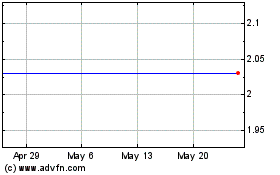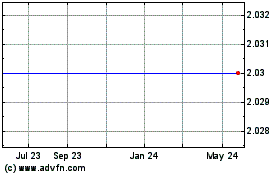Published Clinical Data Suggests that Dacogen(TM), Administered Subcutaneously, is Active as a Treatment for Sickle Cell Anemia
December 04 2003 - 9:15AM
PR Newswire (US)
Published Clinical Data Suggests that Dacogen(TM), Administered
Subcutaneously, is Active as a Treatment for Sickle Cell Anemia
Data appearing in current issue of Blood to be presented at
symposium preceding Annual Meeting of the American Society of
Hematology DUBLIN, Calif., Dec. 4 /PRNewswire-FirstCall/ --
SuperGen, Inc. announced today that results of a clinical study,
published in the current issue of the journal Blood (vol. 102, no.
12, pp. 3855-56), suggest that the investigational anticancer
compound Dacogen(TM) (decitabine for injection) is active in
treating sickle cell anemia. Updated data from the clinical study
will be presented Friday, December 5th at a SuperGen-sponsored
symposium preceding the 45th Annual Meeting of the American Society
of Hematology (ASH) in San Diego. Principal Investigator Yogen
Saunthararajah, M.D., at the University of Illinois at Chicago led
the Phase I/II clinical study. The primary objective of the study
was to test whether subcutaneously administered Dacogen could
safely reactivate fetal hemoglobin. Eight patients diagnosed with
sickle cell anemia and resistant or intolerant to hydroxyurea (the
current standard of care) were enrolled. Each patient received
Dacogen administered subcutaneously, one to three times per week,
in two cycles of six-week duration. Each patient treated with
Dacogen had increases in levels of fetal hemoglobin. Fetal
hemoglobin interacts with sickle hemoglobin to reduce the
complications of sickle cell disease. Some debilitating
complications of sickle cell disease include severe pain,
pneumonia, stroke, and renal failure. Surrogate (laboratory)
indicators of sickle cell disease also improved in Dacogen treated
patients. In addition, levels of total hemoglobin increased an
average of 26 percent. Researchers reported that the subcutaneous
regimen was well tolerated, with the only significant toxicity and
most frequent event being neutropenia. Standard NCI criteria for
toxicity were used. No local toxicity was noted at the subcutaneous
injection site and no nausea, vomiting, diarrhea, constipation or
loss of appetite was reported. "The preclinical and clinical data
continue to be very encouraging and help to validate our belief
that Dacogen could become an important agent in the treatment of
sickle cell disease," said Dr. Saunthararajah, Assistant Professor
of Medicine and Director of the Adult Sickle Cell Clinic at the
University of Illinois at Chicago. Dr. Saunthararajah was the lead
author of the paper that was published in Blood and will present
updated results at the symposium. "The publication of these
encouraging clinical results in the peer- reviewed medical journal
Blood is a further indication that Dacogen may be useful as a
treatment for sickle cell disease," said Craig Rosenfeld, M.D.,
Senior Vice President and Chief Scientific Officer of SuperGen. The
primary mechanism of action for Dacogen in sickle cell disease is
thought to be reduction of DNA methylation at the gamma globin gene
promoter. In the publication, Dr. Saunthararajah directly
demonstrates reduction in gamma globin gene promoter methylation by
two molecular techniques. Dacogen previously received orphan-drug
designation from the Food and Drug Administration (FDA) for the
treatment of sickle cell anemia, which may provide seven years of
market exclusivity if, among other conditions, the drug is approved
for this indication. Sickle cell anemia is an inherited disorder of
the red blood cells. Red blood cells carry oxygen to all parts of
the body using a protein called hemoglobin. Normal red blood cells
contain mostly Hemoglobin A and are shaped like discs. Normal red
cells are very flexible and move easily through small blood
vessels. However, in sickle cell anemia, the red blood cells
contain sickle hemoglobin, which causes them to change to a curved
shape (sickle shape) and become less flexible after oxygen is
released. 'Sickled' cells therefore may become stuck and form
blockages in small blood vessels. Because these vessel blockages
can occur in all parts of the body, damage can occur in any part of
the body. Elevations in fetal hemoglobin are associated with
reduced complication from sickle cell anemia. Sickle cell anemia is
most common among people whose ancestors come from Africa, the
Middle East, the Mediterranean basin, and India. In the United
States, it affects primarily African Americans, more than 50,000 of
whom have the disease, according to the Center for Disease Control
and Prevention. One in 12 African-Americans carries the sickle cell
trait. The median age at death of patients with sickle cell anemia
is reduced by 25-30 years, compared to African-Americans in
general. Based in Dublin, California, SuperGen is a pharmaceutical
company dedicated to the acquisition, rapid development and
commercialization of therapeutic anticancer products. The Company's
website can be reached at http://www.supergen.com/. This press
release contains "forward-looking" statements within the meaning of
section 21A of the Securities Act of 1933, as amended, and section
21E of the Securities Exchange Act of 1934, as amended and is
subject to the safe harbor created thereby. Such forward-looking
statements include statements related to our expectations regarding
Dacogen as a treatment for sickle cell disease. The success of such
product could differ materially from those discussed in the
forward-looking statements as a result of known and unknown risk
factors and uncertainties. Such factors include, but are not
limited to: risks and uncertainties related to conducting clinical
trials, whether Dacogen be studied in expanded clinical trials in
patients with sickle cell disease, if expanded trials are
conducted, whether Dacogen will be safe and effective in treating
patients with sickle cell disease, and whether the company will
submit Dacogen for regulatory approval for any indication, or if
the drug will ever be approved or reach the market. References made
to the discussion of the risk factors are detailed in the company's
filing with the Securities and Exchange Commission including the
report on Form 10-Q for the quarter ended September 30, 2003. These
forward-looking statements are made only as of the date hereof, and
we disclaim any obligation to update or revise the information
contained in any such forward-looking statements, whether as a
result of new information, future events or otherwise. Contact: Tim
Enns, Vice President, Investor Relations & Business
Development, SuperGen, Inc., 800-353-1075, ext.111 DATASOURCE:
SuperGen, Inc. CONTACT: Tim Enns, Vice President, Investor
Relations & Business Development, SuperGen, Inc.,
+1-800-353-1075, ext.111 Web site: http://www.supergen.com/
Copyright
Supergen, Inc. (MM) (NASDAQ:SUPG)
Historical Stock Chart
From Jun 2024 to Jul 2024

Supergen, Inc. (MM) (NASDAQ:SUPG)
Historical Stock Chart
From Jul 2023 to Jul 2024
